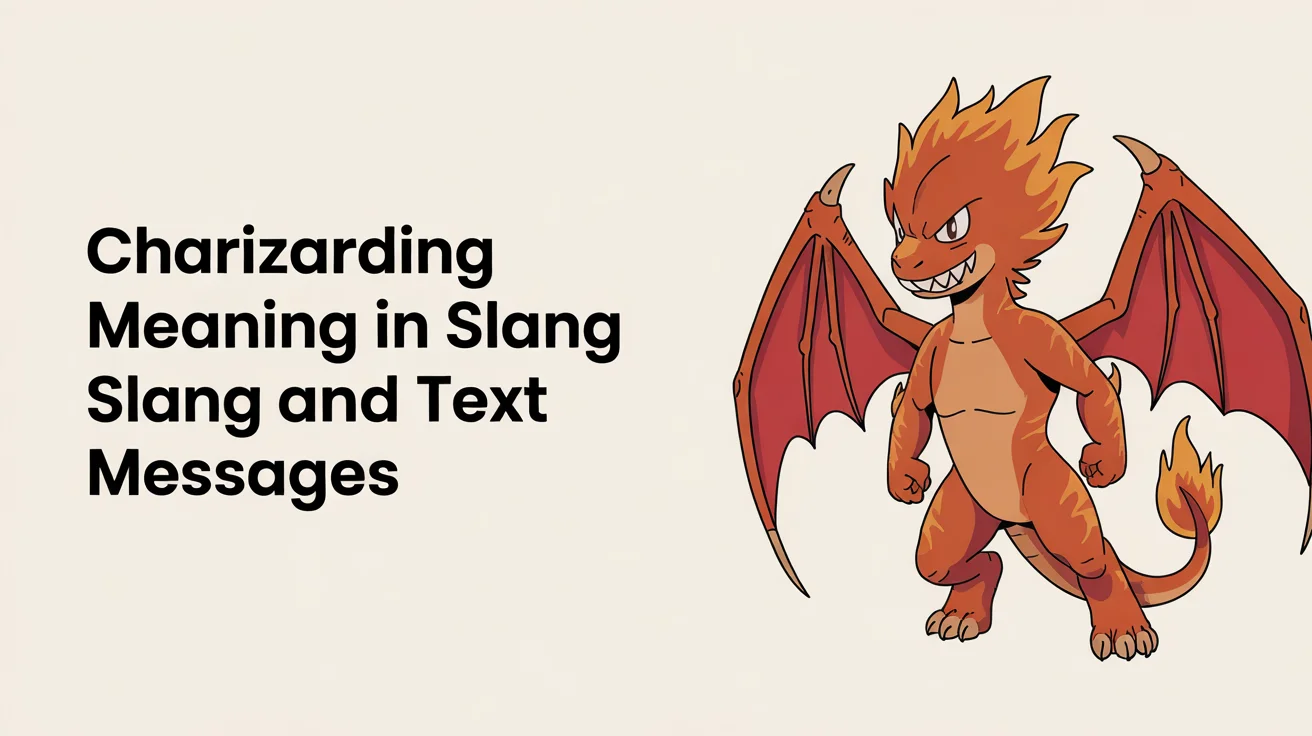Imagine you’re scrolling through your phone and you suddenly see someone say, “He totally got charizarded last night.” You pause and wonder: what the heck does charizarding mean? In the world of digital slang and texting, this term has popped up—and it’s got a weird, wild edge. In this post you’ll discover the origin of charizarding, what it means in slang and text messages, how it shows up in digital conversation, how to respond if it happens to you—or even how not to use it. By the end you’ll be fluent in this odd bit of internet culture.
Origin of “Charizarding”
Let’s dig into where the phrase “charizarding” came from and how it evolved.
Etymology
The term borrows its name (or at least part of its flavour) from the character Charizard—the orange, fire-breathing dragon-like Pokémon known for its blazing tail and intense attacks. In slang-circles the idea of “fire” and “flames” become metaphors for wild behaviour, so the link is there.
First documented uses
According to sources like Urban Dictionary and Slang.org, “charizarding” appears in user-generated definitions that date back to Reddit threads and other internet forums. For example:
“It means lighting a girl’s pubes on fire while having intercourse, then using his semen to put out the flames.” (Distractify)
Other sites state:
“The dubious act of lighting one’s intimate body hair on fire, typically for thrill or foolish display.” (Slang.org)
So there’s a consistent theme: it’s a sensational sexual act linked to fire imagery, clearly named to evoke the fire-dragon vibes of Charizard.
Evolution of meaning
Over time, the term appears to have shifted in some usage. In some contexts it’s used less literally (i.e., actual fire) and more figuratively (e.g., someone getting “burned” in conversation, ghosted, or heavily embarrassed). Others use it purely for shock value or meme culture. The key: the meaning is not benign or mainstream—it stays on the fringe.
Core Meaning: What “Charizarding” Means in Slang
In this section we’ll clarify the primary definition, look at variations and sub-meanings, and clear up misunderstandings.
Primary definition
In its most explicit form, charizarding refers to a sexual act:
- A male partner sets fire to female pubic hair (or intimate body hair) during intercourse. (Distractify)
- Then uses his semen or ejaculate to extinguish the flames. (Urban Dictionary)
- The act is styled as a joke (often referencing Charizard’s flame attack, or the “you don’t have enough badges to train me” line). (Distractify)
Boldly stated: It’s a pretty extreme and risky act.
Variants & sub-meanings
- Literal vs figurative: Some people might describe charizarding even when no fire is involved—e.g., “He charizarded her after the first date” meaning he disappeared or “burned” her emotionally.
- Platform or generational use: The term circulates in TikTok, Reddit, meme pages, and among younger users curious about bizarre sexual trends. For example one Redditor wrote:
“It means lighting a girls pubes on fire while having intercourse.” (Reddit) - Contextual shift: In some cases, the act becomes a metaphor for over-the-top or reckless behaviour rather than its literal meaning.
Common misunderstandings
- Some believe charizarding simply means ghosting someone (disappearing) but that’s not accurate—ghosting lacks the fire/flame metaphor.
- Others think it’s just a joke meme without sexual connotation—but most sources emphasise sexual context.
- Because of its shock-value, many references may be ironic, not genuine.
How “Charizarding” Appears in Text Messages & Digital Conversation
Now let’s look at how you might encounter this in the wild: texts, chats, social platforms.
Examples of usage
Here are fictional representative examples (not real screenshots) to illustrate:
- “Dude got charizarded after 2 dates. Poof—gone.”
- “She thought he was into her… next thing you know he charizarded her.”
- “If you flame-someone then disappear, you’re basically charizarding them.”
Context clues that indicate it’s happening
Signs that someone might be “charizarded”:
- Sudden silence after strong initial interaction (lots of messages → one day nothing).
- Active status visible (online) but no reply to your message.
- Avoidance of explanation: no reason given, just disappearance or extreme behaviour.
- Metaphoric fire talk: explicit mention of “flame”, “burn”, “lighting up”, “you don’t have enough badges”.
Comparison with related slang
| Term | Core meaning | Key difference vs “charizarding” |
| Ghosting | Disappearing without explanation | No explicit “flame/burn” metaphor |
| Breadcrumbing | Sending minimal attention to keep interest | Less dramatic than a fire metaphor |
| Orbiting | Keeping tabs, liking posts but no contact | Passive; no “burn/hurt” implied |
| Charizarding | Burning (literally or figuratively) someone | Fire/flame metaphor + dramatic disappearance |
By placing charizarding in this table, you see clearly how it stands out.
Social & Emotional Dynamics Behind “Charizarding”
Why do people charizard? What happens to those on the receiving end? What broader culture supports this? Let’s explore.
Why people “charizard”
- Avoidance of confrontation: It’s easier to ghost or vanish than to explain things.
- Thrill-seeking / shock value: Especially literal fire usage—someone might do it for adrenaline, or bragging rights.
- Digital attention economy: In a world where people chase likes, views, virality, dramatic acts (or terms) spread faster.
- Cultural memeification: Something crazy happens, it becomes a meme; then people quote it ironically.
Impact on the person being charizarded
- Confusion: “Why did they suddenly vanish? What did I do wrong?”
- Self-doubt: They may blame themselves.
- Emotional trailing: Waiting for a reply, rationalising absence, lingering in uncertainty.
- Risk (if literal): Bodily harm, burns, irreparable damage.
Cultural signals
- Digital-native norms: We talk more through screens, so silence is a message.
- Performance culture: Some acts aren’t about intimacy but spectacle.
- Slang as gatekeeping: If you know terms like charizarding, you’re “in” digitally; if not, you’re out.
How to Respond or Deal With Being “Charizarded”
If you suspect you’ve been charizarded, here’s how to handle it—with dignity and clarity.
Recognising it
Ask yourself:
- Did the other person suddenly vanish when they didn’t before?
- Were they active online but not replying?
- Did they previously flame/hype-up communication then stop?
If yes, you’re likely charizarded (or ghosted with dramatic flair).
Smart responses
- Communicate directly: “Hey, I noticed you’re quiet—just checking in.”
- Set a boundary: “If you’re not into this, please tell me so I can move on.”
- Move on when necessary: If you get no reply, accept it and shift focus—your time’s valuable.
- Protect your feelings: Don’t internalise it as your fault.
Preventive habits (if you might be the ‘charizard-er’)
- Be honest about your interest level.
- Give timely updates rather than vanishing.
- Avoid intentionally dramatic acts just for shock/viral effect.
- Respect consent and safety (especially literal usage involving fire is dangerous).
- Communicate expectation: “I’ll text you later” is better than silence.
Etiquette & Ethical Considerations
There’s a line between slang usage and disrespectful, unsafe behaviour. Let’s cover this.
When charizarding shifts into disrespect or gaslighting
- If you disappear without explanation, you’re potentially dismissing someone’s feelings.
- If you mock someone’s confusion (“Oh you don’t have enough badges to train me”) you degrade their experience.
- Literal acts involving fire and sexual risk move into unsafe territory and may be abusive.
Platform-specific etiquett
- Texting/DMs: Silence = message—manage it carefully.
- Dating apps: If you decide to stop messaging, a short note beats none.
- Social media posts: Don’t post someone’s silence and mock it—it’s immature.
- Sexual context: Consent is mandatory; using fire is high-risk and could cause harm.
Advice for younger users
- Question viral challenges: “Should I light body hair on fire for the views?” Let common sense win.
- Use slang awareness: Just because you hear “charizarding” doesn’t mean you want to try it.
- Think twice about internet “joke” acts—what’s funny for one person may scar another.
- Protect your mental health: Being on the receiving end can sting—seek support.
Read More: DPMO Meaning Explained: A Complete Guide to Defects Per Million Opportunities
Why the Term Matters: Cultural & Communication Insights
This odd term isn’t just a shock-meme—it tells us something about how we communicate today.
A digital-age shift in relational behaviour
When silence becomes a tool, not just absence. The term “charizarding” packages emotional fallout into slang.
People vanish. They ignite drama, then go quiet. They “burn” then disappear.
Attention-economy signals
Our world craves novel, shocking language. “Charizarding” might stand out because it mixes a pop-culture reference (Charizard) with sexual shock value.
It’s loud, memorable, and thus spreads fast.
Linguistic and cultural trends
- Slang evolves fast and often bizarrely.
- Terms like “charizarding” show how subcultures (Reddit, TikTok) generate language.
- Whether people use it literally or jokingly, it enters the dictionary of digital youth.
Social mechanics in table form
| Phenomenon | What it is | Why it matters |
| New slang formation | Term emerging from internet/memes | Shows how language adapts to digital vibes |
| Metaphor of fire/burn | “Burning” someone emotionally or literally | Highlights emotional impact via vivid imagery |
| Digital silence as message | No reply = a message | Silence holds meaning in modern texting |
| Risk and spectacle | Extreme act for viral value | Raises ethics, safety and attention issues |
Quick Reference: “Charizarding” Cheat Sheet
Here’s a handy cheat sheet you can reference quickly.
Definition (one line):
Charizarding = burning (literally or figuratively) someone, especially in a sexual or messaging context, and then vanishing or using dramatic flair.
Yes signs:
- Sudden drop in replies after intense interaction.
- Use of fire or flame metaphors (“ignited”, “burned”, “flame”, “badges”).
- Messaging with “You don’t have enough badges to train me” tone.
- Online activity visible but no response.
No signs:
- Someone busy but clearly apologises or explains.
- Slow reply with decent reason.
- No flame/burn metaphor, just normal communication drop.
When to drop the term / when it doesn’t apply:
- If the silence is due to real emergency or explanation—they’re not “charizarding”.
- If the usage is purely comedic/fictional without actual disappearance.
- If the act is literal fire usage but consensual, planned and legal—it might be something else.
Alternative terms you might use instead:
- Ghosting
- Vanishing
- Engaging then disappearing
- Burning out (in metaphoric sense)
Conclusion
If we boil it down: charizarding might start as a meme-y term but it points to real dynamics. Someone “burns” you—emotionally or digitally—and disappears. The flashy fire image? It drives home the intensity. Silence becomes the message.
Next time you see someone say “I got charizarded”, you’ll know they weren’t just ghosted—they went up in flame and then vanished. Use this knowledge to protect yourself, be clear in your communication, and treat others with respect. The digital world moves fast—make sure you’re not left behind in the burn.
Want to share your own experience or dive into more digital-slang trends? Drop a comment or message—I’d love to hear your take.

The creative soul behind the scenes at PunnyPeeks, Emma Brooke is a curator of charm, color, and celebration. With a love for design and a knack for playful storytelling, Emma brings every event to life with custom balloon decor that speaks louder than words. Her mission? To turn simple moments into joyful memories—full of flair, laughter, and a touch of pun-loving magic.




